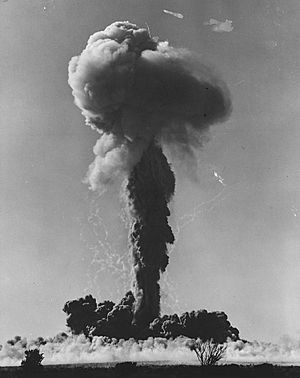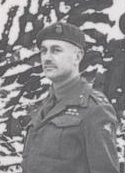Edwin Flavell (RAF officer) facts for kids
Quick facts for kids
Ted Flavell
|
|
|---|---|
| Born | 25 April 1922 Battersea, London, England |
| Died | 24 February 2014 (aged 91) Shipton Gorge, Dorset, England |
| Allegiance | United Kingdom |
| Service/ |
Royal Air Force |
| Years of service | 1937–1968 |
| Rank | Squadron Leader |
| Service number | 56326 |
| Battles/wars | World War II: Palestine Emergency |
| Awards | Air Force Cross |
Squadron Leader Edwin James George "Ted" Flavell was a brave pilot in the Royal Air Force (RAF). He is best known for flying the plane that dropped Britain's first live atomic bomb during a test in Australia in 1956. This important event was part of a series of tests called Operation Buffalo. Ted Flavell was born on April 25, 1922, and passed away on February 24, 2014, at the age of 91.
Contents
Ted Flavell: A Pilot's Story
Early Life and Dreams
Ted Flavell was born in Battersea, a part of London, England, in 1922. His father, Edwin William Conquest Flavell, was a high-ranking officer in the British Army. He fought in both World War I and World War II.
Even though his father and brother chose careers in the Army, Ted had a different dream. He really wanted to join the Royal Air Force, which is the UK's air force.
Joining the Royal Air Force
In 1937, when he was just 15, Ted joined the RAF as an aircraft mechanic apprentice. This meant he learned how to fix planes. A year later, he was chosen to become a pilot and went to Canada for special training.
Flying in World War II
When World War II began, Ted Flavell returned to England. He became a pilot of large bomber planes like the Armstrong Whitworth Whitley and Handley Page Halifax. He flew many secret missions over Europe and Scandinavia. On these missions, he would drop secret agents and supplies into areas controlled by the enemy.
Ted also flew planes that pulled gliders. These gliders carried soldiers for important airborne operations. He helped support the D-Day landings in Normandy (known as Operation Tonga) and the famous Battle of Arnhem (known as Operation Market Garden).
During this time, Ted's father was also a key military leader. His brother, Jim, also fought in the Battle of Arnhem and was captured as a prisoner of war.
The Atomic Bomb Mission
After World War II, Ted Flavell continued his flying career. He flew different types of bomber planes, including the Vickers Wellington and English Electric Canberra. He was among the first pilots trained to fly the new Vickers Valiant bomber.
Ted was assigned to No. 49 Squadron RAF. This squadron operated the Vickers Valiant planes. In 1956, his squadron took part in Operation Buffalo. This was a series of British nuclear tests at Maralinga in South Australia.
On October 11, 1956, Ted Flavell piloted a Vickers Valiant plane. From this plane, the first live atomic bomb ever dropped by a British aircraft was released. The bomb was called Blue Danube. It was a test to see how the bomb would work.
The bomb aimer, Flight Lieutenant Eric Stacey, released the bomb. It exploded high in the air, creating a mushroom cloud. For their bravery and skill in this important mission, Ted Flavell and Eric Stacey were given the Air Force Cross award.

Life After Flying
After his active flying career, Ted Flavell continued to serve in the Royal Air Force. He worked in roles that involved selecting new aircrew members. He also spent two years working in Aden and held a staff position at the Ministry of Defence.
In 1968, after more than 30 years of service, Squadron Leader Flavell retired from the Royal Air Force.
Family and Legacy
In his retirement, Ted Flavell lived in a place called Shipton Gorge in England. He helped out in his community by transporting hospital patients and doing welfare work for the Royal Air Forces Association. He was even made a life vice-president of this organization.
Ted Flavell was the first son of Brigadier Edwin Flavell. He also had a brother named Jim and a sister named Mary. Ted married his wife, Sheila, and they had three children together.
Ted Flavell passed away in 2014 at the age of 91. He is remembered as a dedicated pilot who played a key role in British aviation history.

See also
- Kenneth Hubbard (1920–2004), pilot of the RAF bomber which dropped Britain's first live thermonuclear bomb in 1957
 | Kyle Baker |
 | Joseph Yoakum |
 | Laura Wheeler Waring |
 | Henry Ossawa Tanner |

